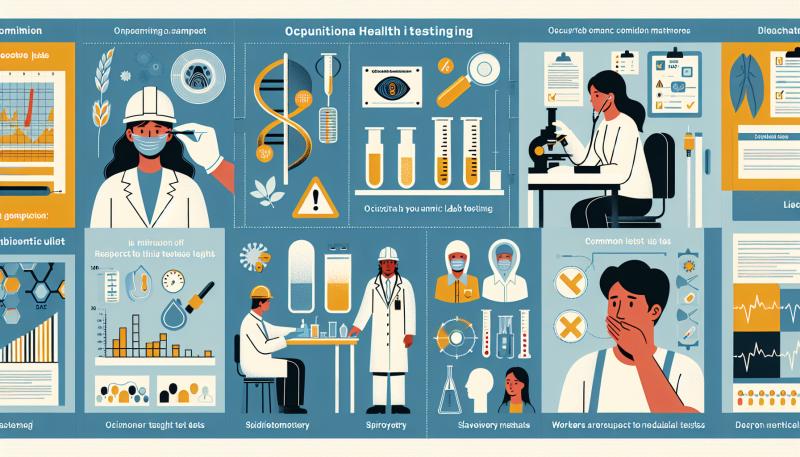
Occupational Health Testing: What Workers Should Be Aware Of
Understanding Occupational Health Testing: What Workers Should Be Aware Of
Occupational health testing is a vital component of workplace safety and ensuring the well-being of employees. For individual consumers—workers across various industries—understanding what occupational health testing entails, why it matters, and what workers should be aware of can significantly impact both personal health and professional performance. Whether employed in industries such as construction, healthcare, manufacturing, or services, occupational health testing offers a proactive approach to maintaining a safe, healthy, and efficient work environment.
What is Occupational Health Testing?
Occupational health testing refers to a range of medical tests and evaluations performed to assess workers' health in relation to their jobs. The primary goal is to prevent work-related illnesses and injuries, as well as to promote overall employee health. These tests are usually conducted as part of an employer's occupational health program, which may include pre-employment screenings, periodic health examinations, and specific tests tailored to job roles or industries.
Common types of occupational health tests include:
- Audiometric Testing: This involves evaluating a worker’s hearing ability, particularly for employees in noisy work environments, to prevent noise-induced hearing loss.
- Vision Testing: Vision tests ensure that employees have the necessary eyesight to perform their tasks safely, which is particularly important for drivers and machine operators.
- Respirator Fit Testing: For workers who are required to wear respirators, fit testing ensures the equipment fits properly and effectively protects against harmful exposures.
- Drug and Alcohol Testing: These tests are conducted to promote workplace safety by ensuring employees are not under the influence of intoxicants while working.
- Functional Capacity Evaluation (FCE): This assessment measures a worker's ability to perform the physical demands of their job, which is crucial for positions involving heavy lifting or repetitive physical tasks.
- Blood and Urine Tests: These tests can detect various health issues or monitor chronic conditions that may affect work performance.
Why Occupational Health Testing Matters
Occupational health testing is not just a regulatory requirement; it benefits both employers and employees in several ways. Here’s why it matters:
- Prevention of Workplace Accidents: By identifying potential health issues, occupational health testing reduces the risk of accidents and injuries, ensuring a safer workplace for all.
- Compliance with Regulations: Many industries are subject to strict health and safety regulations. Regular testing helps employers comply with these standards, avoiding potential fines and legal issues.
- Reduction in Absenteeism: Healthy workers are less likely to take sick leave. Regular health assessments can help in the early detection and management of health problems, reducing absenteeism.
- Enhanced Employee Well-being: When workers perceive that their health and safety are priorities, job satisfaction and productivity often increase.
- Cost Savings for Employers: By preventing workplace-related health issues, employers can save significantly on costs related to healthcare, workers’ compensation, and lost productivity.
What Workers Should Expect During Occupational Health Testing
Understanding what to expect during occupational health testing can help workers feel more comfortable and prepared. Here's what typically happens:
- Scheduling: Tests are usually scheduled during work hours to ensure minimal disruption to employees’ routines.
- Informed Consent: Employees will likely be asked to sign a consent form, authorizing the test and the release of certain results to their employer.
- Privacy and Confidentiality: Employers and testing facilities are required to maintain strict confidentiality of employees’ health information, sharing results only with authorized personnel.
- Follow-up Procedures: If any health issues are detected, follow-up procedures or referrals to specialists may be recommended.
- Results and Feedback: Employees have the right to learn about their test results and understand any implications for their health and work.
Considerations for Specific Industries
Different industries present unique occupational health challenges. Workers should be aware of specific testing relevant to their job:
- Healthcare Industry: Medical screenings, immunizations, and screenings for exposure to infectious diseases are common to protect both healthcare workers and patients.
- Construction and Manufacturing: Testing often focuses on hearing, respiratory health, and physical capabilities due to the physical demands and environmental hazards of these fields.
- Transport and Logistics: Drug and alcohol testing, vision exams, and sleep apnea assessments are crucial for maintaining safety in drivers and operators.
Partnering with Professional Health Screening Services
For both employees and employers, partnering with a professional occupational health testing service can provide added assurance of quality and compliance. Organizations like IMS Screening Solutions specialize in delivering customized occupational health screenings to meet industry-specific requirements, helping businesses maintain a healthy workforce while ensuring compliance with relevant regulations.
In conclusion, occupational health testing plays a critical role in safeguarding the health and safety of workers. By being informed and proactive about occupational health assessments, employees can contribute to a safer and more productive work environment.
For further information or to learn more about customized occupational health testing solutions, consider visiting the IMS Screening Solutions website at https://www.imsscreenings.com.
